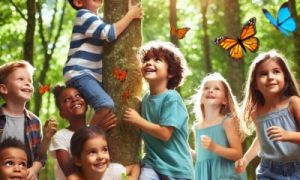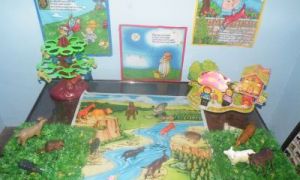

Engaging parents in early childhood activities is a wonderful way to build a strong community and support children's development. The following article provides a list of Activity Ideas For Parents in early childhood settings.
The concept of "time in lieu" in the Children's Services Award refers to compensatory time off given to employees instead of overtime pay. The following article provides information on how time in lieu works.
Workplace bullying is a serious issue that can have significant impacts on an individual's mental health, job satisfaction, and overall well-being. The following article provides information on How To Handle A Workplace Bully, What To Do If Someone Is Ignoring You At Work, What To Do If Someone Is Being Disrespecting You At Work, What To Do If Someone Is Gossiping About You At Work, What To Do If Someone Is Yelling At You At Work and more.
The first few years in a child’s life are when values, ideas and attitudes take shape as the result of their experiences, adult responses and wider cultural influences. This is the time when positive role models can convey powerful lessons on gender equality and interpersonal behaviour which have the potential to impact adult life choices. For such reasons, the following article provides information on Traditional Bias, How Men Are Important, How To Encourage Men To Join The ECE Setting and more.
Effective communication is at the heart of every productive workplace but more so in sectors like ECE where so much depends on positive interactions between key stakeholders, like children, educators, families, management and providers. Non-verbal cues are an integral part of communication as they can complement and reinforce but also contradict and undermine verbal messages. The following article provides information on What Is Non-Verbal Communication, Why It Is Important, How To Use Non-Verbal Communication In The Workplace and more.
As of 1 September, changes to laws mean that the NSW Working with Children Check can now access information held on a national database of people barred from working with children. Additional changes have come into effect by ensuring that NSW applicants or clearance holders will be automatically barred from working with children for a range of serious animal cruelty offences.
The approved provider of an early childhood service, you have the primary legal responsibilities for the safety, care and education, under the National Regulations, of children enrolled. Hence, approvals are required from both the Australian Government as well as state and territory governments. The following article provides information on Approved Provider Meaning and Responsibilities, Types Of Approval, Approved Provider Under The National Regulations, Application Process and more.
Interactions with children and families lie at the heart of ECEC practices. Early educators as a result may find themselves frequently facing ethical issues which are all too common in professions revolving around human relationships with their spectrum of rights, responsibilities, needs and desires. The following article provides information on Identifying Ethical Issues, Ethical Responsibilities, Case Study and more.
The structure and organisation of a learning environment can have immense impact on all aspects of a child’s development, ranging from physical and cognitive to social and emotional growth. The following article provides information on What Are Interest Areas and Their Benefits, Common Interest Areas, Guidelines For Planning Interest Areas and more.
Children need safe and positive environments to learn and grow. To ensure this, services and educators need to ensure effective supervision at all times. The following article provides information on the different aspects of supervision, ranging from regulatory requirements and principles to practice strategies.
 Here is the list of the EYLF Learning Outcomes that you can use as a guide or reference for your documentation and planning. The EYLF… Read More
Here is the list of the EYLF Learning Outcomes that you can use as a guide or reference for your documentation and planning. The EYLF… Read More
 The EYLF is a guide which consists of Principles, Practices and 5 main Learning Outcomes along with each of their sub outcomes, based on identity,… Read More
The EYLF is a guide which consists of Principles, Practices and 5 main Learning Outcomes along with each of their sub outcomes, based on identity,… Read More
 This is a guide on How to Write a Learning Story. It provides information on What Is A Learning Story, Writing A Learning Story, Sample… Read More
This is a guide on How to Write a Learning Story. It provides information on What Is A Learning Story, Writing A Learning Story, Sample… Read More
 One of the most important types of documentation methods that educators needs to be familiar with are “observations”. Observations are crucial for all early childhood… Read More
One of the most important types of documentation methods that educators needs to be familiar with are “observations”. Observations are crucial for all early childhood… Read More
 To support children achieve learning outcomes from the EYLF Framework, the following list gives educators examples of how to promote children's learning in each individual… Read More
To support children achieve learning outcomes from the EYLF Framework, the following list gives educators examples of how to promote children's learning in each individual… Read More
 Reflective practice is learning from everyday situations and issues and concerns that arise which form part of our daily routine while working in an early… Read More
Reflective practice is learning from everyday situations and issues and concerns that arise which form part of our daily routine while working in an early… Read More
 Within Australia, Programming and Planning is reflected and supported by the Early Years Learning Framework. Educators within early childhood settings, use the EYLF to guide… Read More
Within Australia, Programming and Planning is reflected and supported by the Early Years Learning Framework. Educators within early childhood settings, use the EYLF to guide… Read More
 When observing children, it's important that we use a range of different observation methods from running records, learning stories to photographs and work samples. Using… Read More
When observing children, it's important that we use a range of different observation methods from running records, learning stories to photographs and work samples. Using… Read More
 This is a guide for educators on what to observe under each sub learning outcome from the EYLF Framework, when a child is engaged in… Read More
This is a guide for educators on what to observe under each sub learning outcome from the EYLF Framework, when a child is engaged in… Read More
 The Early Years Learning Framework describes the curriculum as “all the interactions, experiences, activities, routines and events, planned and unplanned, that occur in an environment… Read More
The Early Years Learning Framework describes the curriculum as “all the interactions, experiences, activities, routines and events, planned and unplanned, that occur in an environment… Read More

The Education and Care Services National Law and National Regulations prescribe requirements for children participating...
See more...
Cold weather play is incredibly beneficial for early childhood development! It helps children build resilience...
See more...
Open ended materials enables children to play freely. They are objects that have no rules...
See more...© 2009-2025 Aussie Childcare Network Pty Ltd. All Rights Reserved.

